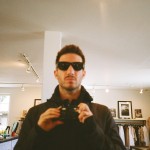If you’re reading this, the chances are that you know the magnitude of what we’re going to embark on. You were there when it happened. You were affected by it in some way. The date that has become one of the most prominent markers on the timeline of the history of the world. A date that has altered our understanding of time as pre- and post-9/11. It’s here, PenTalers. We’re now going to take a walk together on the 9/11 week. It promises to be an experience everyone would want to be a part of, so stick along. You never know how this week could impact you.
Dee’s story of today is probably something a lot of people who were fortunate enough to not even be a direct witness of the tragedy would identify with. As someone who was off the scene, Dee reminds us that the distance does not lessen the impact. And he beautifully reminds us that there are still some people who can still shrug off this catastrophic incident because they may not comprehend its significance. I think of the children born in the category of post-9/11. Should they even be made privy to the terrors the world faced before they arrived in it?
Some things I remember; some things I forget. We were in the old building when I first heard, that much I recall. The corridor was empty and a colleague with arms and legs crooked as sticks and her this-way-that-way hair shocked prematurely white and her eyes wide in fright even when there was none, and she stopped me and said, ‘They’ve hit the twin towers. It’s awful.’ Her big voice was made small in the empty space we were in. ‘It’s awful,’ she said again.
I nodded and looked concerned without really understanding. She waved her hands in the air and hurried away with a crazed look on her and a shock-gasp story she had to tell to everyone she met that. Her name is lost to me now, this wide-eyed messenger; I have not seen her in years and had forgotten her till this morning.
But back then, what she said, I had not understood at first. It was not till I got home that I made sense or no sense of her flapping hands and the madness in her telling of the story. There it was when I switched on the televison. I flicked through the channels and it was everywhere: the planes exploding like special effects in a film, over and over and over; and people falling, or floating, down from impossibly high windows, the specks of people; and the towers not being tall any more, but twin absences. Seeing it changed things; somehow it did.
We are in a new building now. Been there seven years already so it doesn’t feel new, and there’s a crept-up-on-me grey in my hair and my face is a map of all my years. It’s in the news again, what happened back then, everywhere you look, and everyone saying, ‘I can’t believe it’s been ten years!’ Ten years since it happened and I remember some things and have forgotten others. I remember that I couldn’t stop watching it, seeing it all played over and not believing it could be; I forget the woman who told me, her name at least.
I tell my story, such as it is. I tell it to someone I hardly know, a new member of staff, young and pretty, her blue-sky eyes flecked with amber and her skin as unmarked as new paper. I hold her back from her work, and I tell her, and she looks at me funny. I realise then that my hands are flapping in the air and my words are all spit and small shriek and the girl in front of me has that look that I once had: a feigned concern and not really understanding.
‘The world’s been stood on its head ever since,’ I say, and she doesn’t get that either, for this brave new world is the only world she’s ever known.



Comments are closed